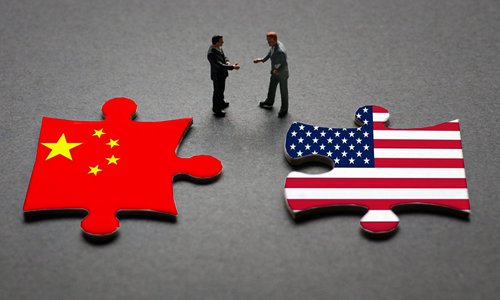HOME >> OPINION
‘Rivalry partners’ theory founders on scrutiny
By Song Wei Source:Global Times Published: 2019/7/14 20:18:41

Photo: IC
In Graham Allison's article titled "Could the United States and China be Rivalry Partners" published in National Interest, the Douglas Dillon Professor of Government at Harvard University explores the notion of "rivalry partners," in an effort to provide Beijing and Washington ways in which they could escape the Thucydides Trap.
After analyzing the US-Soviet Union relationship during the Cold War, an era marked with confrontation and cooperation, along with how "the Song Emperor of China agreed to establish with the Liao, a Manchurian kingdom on China's northern border, after concluding that his armies would not be able to defeat them," Allison said avoiding war between a hegemonic power and a challenger is possible.
He believes that fierce confrontation and collaboration will be the norm. The basis of their rivalry will see the strategic partnership share common interests. Therefore, confrontational cooperation can be realized between Beijing and Washington to avoid wars and achieve peaceful competition.
Allison's new concept is of great practical significance. It can help ease tension and pessimism among China-US relations. Strategic competition between both sides has stretched from the trade conflict to economic systems, cross-Taiwan Straits relations, the South China Sea issue, dominance on regional cooperation and global governance concepts.
The Chinese side may not be interested in being the new leader in the international community, but conflicts between Beijing and Washington over domestic systems and international institutions will exist. Given the fundamental systematic differences, people tend to associate the China-US conflict with the Cold War.
The Cold War was not an actual war. There were no direct military clashes between the US and the Soviet Union, and the international community was peaceful.
So, the question is, can China and the US become "rivalry partners" against the backdrop of a possible new cold war?
The balance of nuclear terror and managing global issues make up the foundation of a rivalry partnership. Allison believes that these two characteristics can play a vital role in today's cooperation between China and the US. It's an objective and rational philosophy.
Although the balance of nuclear terror between China and the US cannot equal that between the Soviet Union and the US, China has second strike capabilities, which means it can respond to a nuclear attack with nuclear retaliation. Hence, the possibility of a war between the two would be unlikely.
Compared to those in the Cold War era, global issues today are more extensive and pressing. Sweeping common interests exist between Beijing and Washington over climate change and global financial stability, among others.
As Allison explained, "in Thucydidean rivalries, the most frequent trigger for war is an extraneous event - a third party provocation or even accident like the assassination of the Archduke in Sarajevo. Both nations thus have a vital national interest in working together to prevent and manage crises that could drag them into general war."
Different ideologies and domestic systems influenced competition between the US and the Soviet Union during the Cold War. Such differences between China and the US are not as significant as they were between the US and the Soviet Union.
After decades of reform and opening-up, China has emerged as a market economy, integrating itself into the international economic system. During the Cold War, however, the US was a market economy while the Soviet Union was a different planned economy.
The US now defines China's economic system as state capitalism, which to a certain extent acknowledges the nature of China's market economy. Although the US views China-US economic relations from a negative perspective, the judgment that the bilateral economic and trade relationship serves as the foundation for bilateral ties no longer exists.
However, this does not mean interdependence and mutual benefits between the two have vanished. On the contrary, the US cares more about profits than common interests. Compared with US-Soviet ties during the Cold War era, the level of conflict between Beijing and Washington is much lower.
Despite being objective and rational, Allison's concept is not new, nor is "rivalry partners" a good theory. The coexistence of confrontation and cooperation is a normal aspect of relations among powers.
"Rivalry partners" would mislead others into thinking that China and the US were still partners. Yet the truth is, the two have entered a new phase of strategic competition mainly consisting of soft confrontation. Soft confrontation has become the latest characteristic of their relationship.
Which side can enjoy healthier development with stronger capabilities to shape the future global system and gain more support from the international community will determine the outcome of their bilateral competitive relationship.
The author is a research fellow at the National Academy of Development and Strategy and professor at the School of International Studies, Renmin University of China. opinion@globaltimes.com.cn
RELATED ARTICLES:
Posted in: VIEWPOINT